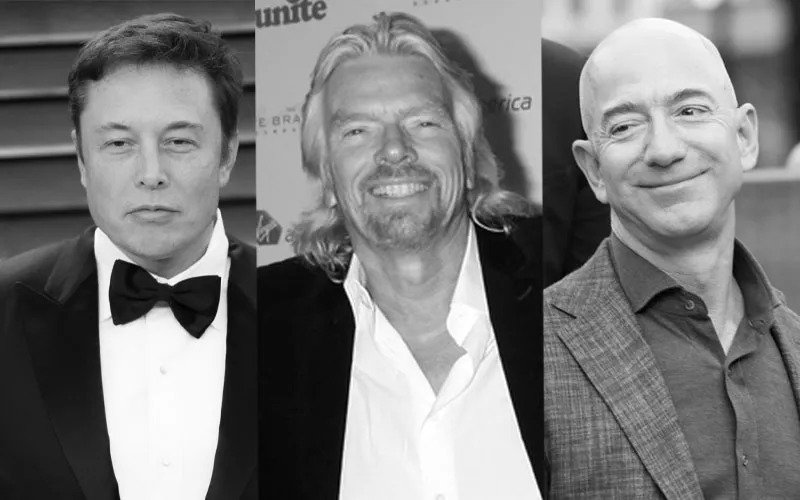The gap keeps widening between the super rich tech superstars and the merely super. Some miscellaneous musings on why.

31 July 2021 – The already bonkers dollars of Big Tech have become even bonkers-er. Big Tech just had one hell of a big quarter. To summarize:
-Apple Q3 ’21: Revenue up 36% year over year (YoY)
-Microsoft Q4 ’21: +21% YoY
-Alphabet Q2 ’22: +62% YoY
-Tesla Q2 ’21: +98% YoY
-Facebook Q2 ’21: +56% YoY
-Amazon Q@ ’21: +52% YoY
I’ve written gigabytes about the unreal sales, profits and oomph of America’s five technology titans – Amazon, Apple, Facebook, Google and Microsoft. So this might feel like old news. Tech’s Titanic 5 have been big and rich for a long time, and they’ve gotten even more so as people and organizations have needed their products during the coronavirus pandemic … yadda, yadda, yadda. You get it.
No, you really don’t get it. America’s technology superstars have launched into a completely different stratosphere than even other wildly successful companies in tech and beyond. Let me give you a flavor of the bonkers-ness:
– The current stock market value of the Big Five ($9.3 trillion) is more than the value of the next 27 most valuable U.S. companies put together, including corporate giants like Tesla, Walmart and JPMorgan Chase, according to data from S&P Global Market Intelligence.
– Apple’s profit just from the past three months ($21.7 billion) was nearly double the combined annual profits of the five largest U.S. airlines in prepandemic 2019.
– Amazon’s stock price increases have made Jeff Bezos so rich that he could buy a new model iPhone for 200 million people — and he would still be a billionaire.
– Google’s $50 billion in revenue from selling advertisements from April to June was about what Americans — all of the Americans — spent on gasoline and gas station purchases last month.
– The annual revenue of one of Microsoft’s side businesses, LinkedIn, is nearly four times that of Zoom Video Communications, a star of the pandemic, in the past year.
– Facebook expects to dole out more cash outfitting its computer hubs and offices in 2021 than Exxon spends around the world to dig oil and gas out of the ground in a year.
I know that lots of odd things are happening in the U.S. economy right now. But I cannot adequately explain how “not normal” these numbers are from the tech superpowers. Maybe that’s why Bezos wanted to touch outer space; the Big 5 tech giants have outgrown Earth.
What’s clear more than ever is that America’s tech titans have formed a separate universe in which they are the sun, and everyone else — billions of humans, other companies, entire countries and governments — are mere planets that revolve around them.
Perhaps even more surprising than the size and scale of these companies is how they have mostly grown more profitable in what could or should have been economic conditions that hurt their profits.
I have been befuddled that Amazon and Apple have shown higher profit margins than those companies have had for years — possibly ever. That has happened even though the pandemic has forced those companies to reorganize factories or warehouses, deal with disrupted global shipping, scramble for parts in short supply and spend a fortune to keep their workers safe.
That chaos and unplanned spending should have made the companies less profitable, not more so.
Apple did spook investors a little by saying this week that it was having trouble getting all the parts it needs for the next few months. And Amazon’s stock were down more than 7 percent as investors had expected sales to be even higher and the outlook for the next quarter to be rosier. So Amazon value has “stalled” at about $1.8 trillion – more than twice its value before the pandemic 🙂
What does all this mean? Well, for one thing, members of Congress or state attorneys general might look at the numbers and ask: If, as the Big Tech companies say, they face stiff competition and could die at any moment, how could profit margins keep going up like this? But I’ll save my fire on tech regulation for a longer post due out this fall.
Logic would suggest that if the companies are fighting off lots of rivals, they might have to cut prices and profit margins would shrink. So how does Facebook turn each dollar of revenue, nearly all from ads it sells, into 43 cents of profit — a level that most companies can only dream of, and higher than Facebook posted before the pandemic?
I’ve questioned before in my blog posts if America’s Big 5 tech titans are becoming invincible, first focusing on Amazon. As the gap keeps widening between the super rich tech superstars and the merely super, I’m convinced the answer is “yes”.
PART 2
What the Moon and the Metaverse Have in Common

Lewis and Clark, Ernest Shackelton, Roald Amundsen — they just couldn’t sit still and not dream of uninhabited places. George Mallory, a climber who lost his life on Everest, had earlier been asked why he climbed it. He answered, “because it is there” (a quote wrongly attributed to Sir Edmund Hilary).
Today we can see the distant edges of two new territories ripe for new kinds of exploration – one physical, one virtual. One is in outer space, the other in digital space. Both are fueled by big egos, big dreams, and the same pioneering passion for the unexplored.
Three brash (and that’s the kind word) entrepreneurs: Richard Branson, Jeff Bezos, and Elon Musk have set their sights set on space travel, each with a different variation on the theme. According to CNN, the trio has a combined net worth of $400 billion, roughly the size of the GDP of the nation of Ireland. And they’re spending much of it on space travel.
Musk is operating a commercial service under contract for NASA to ferry people to and from space. Musk is also interested in sending people to Mars. With his contracts, and despite the fact that he personally has thus far remained grounded, Musk may be farthest along.
Bezos is currently dreaming of space colonization. He imagines living and working in space, in the likely event that Earth reaches a point where it’s a less desirable habitat. He is so eager to make progress that he seems to be trying to bribe NASA to let him help build the next lunar lander after his Blue Origin space company lost out to Musk’s SpaceX on the recently-awarded initial contract.
Branson’s focus is also on space tourism, giving new heights to the name Virgin Galactic. Their stories of conquering new lands will be read by children of the next generation
Back on Earth, the pioneers are heading to the metaverse – also to colonize, set up communities and invite tourists to visit.
Short definition: the Metaverse is a collective virtual shared space including the sum of all virtual worlds and the Internet. It may contain derivatives or copies of the real world, but it is distinct from Augmented Reality. The word “metaverse” is made up of the prefix “meta” (meaning beyond) and the stem “verse” (a backformation from “universe”); the term is typically used to describe the concept of a future iteration of the internet, made up of persistent, shared, 3D virtual spaces linked into a perceived virtual universe. The term was coined in Neal Stephenson’s 1992 science fiction novel “Snow Crash”, where humans, as avatars, interact with each other and software agents, in a three-dimensional space that uses the metaphor of the real world. Stephenson used the term to describe a virtual reality-based successor to the Internet. And for those of you involved in tech regulation it will create a regulatory nightmare 🙂
Whether it’s the gamer community, the NFT/crypto folks, or AR and VR developers, it’s a virtual land grab for engagement. The big idea is to create completely immersive worlds that exist only digitally. Like in space, you might work there, play there, be entertained or set up shop. Like space, the metaverse has been talked about as a place where new rules can be written, and new values and norms explored.
Just this month Mark Zuckerberg’s company, Facebook, announced it would be heading to the metaverse in a big way. According to Zuckerberg, the future of Facebook’s community is in the metaverse. For the moment, the only glimpse we have into that vision is through Oculus Rift VR glasses, owned by Facebook, and the variety of experiences offered through them.
While Zuckerberg hopes to be Master of the Metaverse, he is far from alone and far from the most experienced. Companies like Virbela are digital-first from their roots, whether it’s to learn, play or meet. Even their own employees trudge to work each day in a digital twin of the physical world. MootUp, a 3D immersive environment, just partnered with Verizon’s Blue Jeans (software kind of like Zoom) to offer enterprises the opportunity to mingle in the metaverse. Niantic, the maker of Pokemon Go, has embarked on the boldest vision of the metaverse to date. It is building an AR replica of the entire planet, offering visitors a chance to experience the real world, but augmented with digital information.
An important part of the metaverse is that its shingle reads “open for business.” Whether it’s a concert, fashion show, disco evening, learning symposium, or something else, metaverse companies are encouraging brands and creators to offer unique experiences in their digital worlds. Companies with services like Fortnite, Minecraft, and Animal Crossing, though their roots are in gaming, have already attracted big investment dollars and big sponsorship dollars from brands.
One of the premiere metaverse destinations began life as a children’s game. Early on, Roblox adopted a few tenets that turn out to be somewhat foundational to a metaverse. It makes its users part of its revenue-sharing model. As users create new games on the platform, they open the platform to other brands that want to build worlds in Roblox. There’s also a MIM-currency to spend (for Magic Internet Money) and Roblox also has given its audience agency to dress, groom and raise their own avatars, which proved wildly popular. Companies including Nike, Disney, Warner Bros., and Gucci are actively setting up experiences there.
The cost of exploring the metaverse is magnitudes lower than space exploration, of course, but what they have in common is the lure of uncharted areas. The unknowns are vast. Of course, just like with the explorers of yore, the course of history will inevitably be altered by greed, motive, and human error.
But make no mistake, the Moon and the Metaverse are open for business.